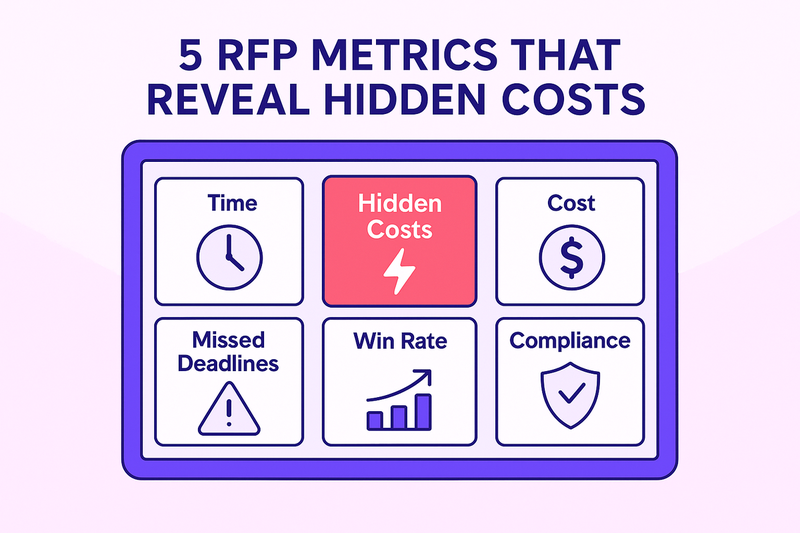A New Way of Preventing AI Hallucinations
May 7, 2025
By
Evie Secilmis

Your RFP team is turning to AI to streamline proposals. But what happens when that AI starts making things up? This is the critical issue of AI hallucinations—when generative models produce inaccurate or fabricated responses. In the high-stakes world of RFPs, a single wrong answer can derail your entire effort. While fine-tuning models seems like a solution, it often doesn't fix the root cause. The key to preventing AI hallucinations isn't just about tweaking your current setup. We'll show you how to prevent AI hallucinations by choosing a system built on your own verified data, so you can respond with both speed and total confidence.
Why does this happen?
These models are built to conform to instructions, even if it means fabricating answers. The result? Legal and compliance risks, misinformation in proposals, and lost deals. It’s no surprise that many companies are still hesitant to fully embrace AI—it often feels impersonal and unreliable.
The root of the problem lies in how these models work. OpenAI systems typically analyze massive datasets from the open web, looking not at the actual meaning of the text but at patterns in language. This can result in surface-level answers that lack substance or accuracy.
What Are AI Hallucinations, Really?
Let's clear this up right away. AI hallucinations aren't some kind of digital daydream. In simple terms, AI hallucinations happen when an AI tool makes up information that is wrong or misleading but presents it as if it were true. Think of it as the AI confidently filling in gaps in its knowledge with plausible-sounding fabrications. This isn't a bug in the system; it's a byproduct of how large language models are designed. They are built to predict the next most likely word in a sequence, which makes them incredibly creative. But when that creativity isn't grounded in facts, it can lead them to invent details, sources, and entire narratives from thin air, all while maintaining a completely authoritative tone.
This tendency is especially dangerous when you’re relying on AI for fact-based tasks, like responding to a detailed security questionnaire or RFP. The model doesn't "know" it's lying—it's simply completing a pattern based on the vast, and sometimes incorrect, data it was trained on. It prioritizes creating a coherent and grammatically correct response over a factually accurate one. Understanding this core behavior is the first step to mitigating the risks. You have to remember that you're working with a powerful pattern-matching machine, not an all-knowing oracle, and it needs to be guided and verified accordingly.
The Real-World Impact of AI Hallucinations
While a funny or nonsensical AI response might be entertaining in a low-stakes chat, the consequences can be severe in a business context. When you’re building proposals and responding to due diligence questionnaires, every word matters. An AI hallucination can introduce errors that undermine your company's credibility, create legal liabilities, and ultimately cost you the deal. The impact isn't just theoretical; it's a tangible risk that teams are facing as they integrate AI into their workflows. The pressure to be fast can't come at the expense of being right, and relying on unchecked AI output is a gamble with your reputation on the line.
How Often Do AIs Get It Wrong?
The frequency of AI errors is probably higher than you think. These models are not infallible, and their mistakes can be subtle and hard to catch. For instance, one study published in Nature found that when asked to provide scientific references, chatbots produced incorrect citations between 30% and 90% of the time. Now, imagine that level of inaccuracy applied to your product specifications, security protocols, or case study data within an RFP response. If an AI is willing to invent academic sources, it's just as likely to invent a feature your product doesn't have or misstate a critical compliance detail. This isn't a minor glitch; it's a significant reliability issue that demands a robust verification process.
High-Stakes Consequences in Business and Beyond
The ripple effects of AI-generated misinformation are massive. Beyond the business world, unchecked AI can spread false narratives in news, education, and even scientific research, leading to widespread confusion and distrust. For your sales team, the stakes are just as high. Submitting a proposal with hallucinated information—like a non-existent security certification or an exaggerated performance metric—can get you disqualified from the running. Even worse, if the error is discovered after the contract is signed, it could lead to breach of contract claims, financial penalties, and irreparable damage to your company's reputation. In the world of enterprise sales, trust is your most valuable asset, and AI hallucinations put that asset directly at risk.
Why Do AI Hallucinations Happen?
AI hallucinations aren't random glitches; they stem from specific, identifiable causes related to how these models are built and trained. Understanding these root causes is key to developing strategies to prevent them. It’s not about the AI being intentionally deceptive. Instead, it's about the limitations of its training data, the way it processes information, and how it's prompted to respond. By looking at these factors, you can start to see why a general-purpose AI might not be the right tool for a high-stakes, detail-oriented task like proposal generation, and why a more controlled environment is necessary for reliable results.
Poor Quality Training Data
The old saying "garbage in, garbage out" is especially true for artificial intelligence. Large language models are trained on enormous datasets scraped from the internet, which includes a mix of high-quality articles, forums, social media, and everything in between. If the AI is trained on insufficient, outdated, or poor-quality information, its ability to generate accurate responses will be compromised. It learns from the patterns it sees, and if those patterns include biases, misinformation, or simply old data, the AI will reproduce them in its answers. It doesn't have a built-in fact-checker to distinguish good information from bad; it just processes what it's given.
Data Compression and Overfitting
When an AI model is trained, it compresses a massive amount of information into a complex network of parameters. During this process, some details can get lost or jumbled. The model might also "overfit," meaning it learns its training data too well, including the noise and specific examples, but struggles to apply that knowledge to new, unseen questions. As a result, when asked something that falls between the gaps in its compressed knowledge, it might generate a response by blending related but distinct concepts, leading to a plausible but factually incorrect answer. It's like trying to recall a book you skimmed a year ago—you remember the gist, but you might invent the details.
The Human Element in AI Training
The way humans train and fine-tune AI models also plays a role. During a process called Reinforcement Learning from Human Feedback (RLHF), human reviewers rate the AI's responses. Often, reviewers may inadvertently reward the AI for providing a comprehensive and confident-sounding answer, even if it contains subtle inaccuracies. This teaches the model that appearing helpful and thorough is more important than being 100% correct. Over time, this reinforces the behavior of filling in knowledge gaps with fabrications, because a complete (but partially wrong) answer is often rated higher than an honest "I don't know."
Confusing Prompts and Leading Questions
Finally, the way you interact with the AI can directly influence its likelihood of hallucinating. Vague, ambiguous, or deliberately confusing prompts can cause the AI to make assumptions and generate a fabricated response. If you ask a leading question that implies a false premise, the AI will often try to provide an answer that aligns with that premise rather than correcting you. It's designed to be helpful and follow instructions, so if your instructions are unclear or based on incorrect information, you're essentially setting the AI up to fail and produce a hallucinated answer.
Common Types of AI Hallucinations
AI hallucinations can show up in a few different ways, from subtle inaccuracies to completely fabricated "facts." For proposal and security teams, spotting these errors is critical, as they can hide in plain sight within an otherwise well-written response. Knowing what to look for is the first step in catching these mistakes before they make their way into a client-facing document. The most common types of hallucinations fall into two main categories: outright factual errors and information that is simply outdated or used in the wrong context. Both can be equally damaging to your proposal's credibility.
Factual Errors and Fake Citations
This is one of the most blatant forms of hallucination. An AI might confidently invent details, statistics, or references to support its claims. We've seen this in the legal field, where AI has fabricated entire court cases, and it can easily happen in an RFP response. For example, the AI might invent a security certification your company doesn't hold, create a fake customer testimonial, or cite a non-existent industry award. These errors are particularly dangerous because they look credible at first glance and require a subject matter expert to identify them as false, making a thorough human review process absolutely essential.
Out-of-Context or Outdated Information
Sometimes, the information the AI provides isn't entirely fake, but it's either old or applied incorrectly. Because general-purpose AI models are trained on a static snapshot of the internet, they often lack real-time information. An AI could pull an old pricing model, reference a discontinued product feature, or describe a workflow that your company updated months ago. This can lead to harmful results if people believe them, creating confusion and setting incorrect expectations with potential clients. This is a major risk for any company whose products, policies, and pricing evolve over time.
How to Prevent AI Hallucinations: Practical Strategies
The good news is that you're not powerless against AI hallucinations. While you can't eliminate them completely, especially with general-purpose tools, you can adopt strategies to significantly reduce their frequency and catch them before they cause problems. It comes down to a combination of smarter prompting, using the right AI architecture, and maintaining rigorous human oversight. By being intentional about how you use AI, you can guide it toward accuracy and make it a more reliable partner in your proposal process. These techniques will help you get more value from AI while minimizing the inherent risks.
Master Your Prompts
The quality of your AI's output is directly tied to the quality of your input. Vague prompts lead to vague (and often incorrect) answers. To get better results, you need to master the art of prompt engineering. This means you should provide detailed instructions, context, and specific requirements to limit the AI's need to make assumptions. The more guidance you give the model, the less room it has to stray from the facts and start inventing things. Think of yourself as a manager giving a very clear assignment to an intern—the more detail you provide, the better the final product will be.
Use Chain-of-Thought Prompting
Instead of just asking for a final answer, ask the AI to explain its reasoning step-by-step. This technique, known as chain-of-thought prompting, forces the model to go through a logical sequence to arrive at a conclusion. It makes the AI's process more transparent and often leads to more accurate results, as it's less likely to jump to a conclusion. For example, instead of asking "Is our product compliant with SOC 2?" you could ask, "First, list the key requirements for SOC 2 compliance. Second, compare those requirements to our product's security features. Finally, determine if our product is compliant."
Assign the AI a Role
Giving the AI a persona or role can help frame its response and improve its accuracy. For instance, you can tell the AI to act as an expert in a specific field. Start your prompt with a phrase like, "You are a senior proposal writer with expertise in cybersecurity compliance. Your task is to..." This instruction helps the model access the most relevant information and patterns from its training data, focusing its response on the specific context you've provided and reducing the chances of it pulling in irrelevant or incorrect information.
Provide Examples (Few-Shot Prompting)
If you have a specific format or style you want the AI to follow, show it what you mean. This is called few-shot prompting, where you give the AI a few examples of inputs and desired outputs before giving it your actual task. For instance, you could provide two examples of poorly worded RFP questions and the ideal, well-written answers your team has used in the past. This gives the model a clear template to follow, making it much more likely to produce a response that meets your standards and aligns with your company's voice.
Set Clear Boundaries
Just as important as telling the AI what to do is telling it what *not* to do. You can set clear boundaries in your prompt to prevent it from making common mistakes. For example, you could add instructions like, "Do not mention any product features that are still in beta," or "Only use information from our official security whitepaper dated Q3 of this year." These negative constraints act as guardrails, helping to keep the AI's response focused on the correct and relevant information and preventing it from speculating or pulling in outdated data.
Adjust the AI's System and Settings
Beyond just crafting the perfect prompt, you can often control the AI's behavior through its underlying system and settings. Many AI platforms offer options to fine-tune how the model generates responses. For high-stakes tasks like proposal writing, you'll want to configure the AI for maximum accuracy and factuality, even if it means sacrificing some creativity. This involves using specific architectural approaches and adjusting parameters that govern the model's output, giving you another layer of control over the results you get.
Use Retrieval-Augmented Generation (RAG)
This is one of the most effective methods for fighting hallucinations. Retrieval-Augmented Generation, or RAG, is an approach where the AI is given access to a specific, curated database of information to use when generating its answer. Instead of relying on its broad, internet-based training, the model first retrieves relevant documents from your trusted knowledge base (like your company's internal wiki, product documentation, or past proposals) and then uses that information to construct its response. This grounds the AI in factual, up-to-date content, dramatically reducing the risk of hallucinations. Purpose-built platforms, like HeyIris, are built on this principle to ensure responses are always based on your company's verified truth.
Lower the "Temperature" Setting
Many AI models have a "temperature" setting that controls the randomness of their output. A higher temperature encourages more creative and diverse responses, while a lower temperature makes the AI more focused and deterministic. For factual tasks like answering RFP questions, you should always use a lower temperature setting. This makes the model less likely to take creative liberties and more likely to stick to the most probable and fact-based answer derived from its training data and any provided context. It's a simple tweak that can significantly improve the reliability of your AI's output.
Always Ask for Sources
To hold the AI accountable, make it a habit to ask the AI to cite its sources. When using a RAG system, you can instruct the model to show you exactly which documents or passages from your knowledge base it used to generate its answer. This creates a clear audit trail and makes the fact-checking process much faster and easier. If the AI can't provide a source for a claim, that's a major red flag that the information might be hallucinated. This simple step builds transparency and trust into your AI-assisted workflow.
Implement Human Oversight and Fact-Checking
No matter how advanced your AI system is, it should never operate without a human in the loop. AI is a powerful tool for creating first drafts and augmenting the work of your team, but it is not a replacement for human expertise and judgment. The final and most critical step in preventing hallucinations from ending up in your proposals is to always have subject matter experts review and approve AI-generated content. Your team's knowledge is the ultimate safeguard against errors, ensuring every response is accurate, contextually appropriate, and aligned with your company's standards before it goes out the door.
For Sales Teams, Accuracy Isn't Optional
When you're responding to RFPs, SOWs, or security questionnaires, a single inaccurate statement can cost you the deal. General-purpose AI tools pull from the open internet, making them prone to the very hallucinations we've discussed. This is a massive risk for sales and proposal teams who need to generate accurate, consistent, and trustworthy responses every time. Relying on a tool that might invent a security protocol or misstate a product feature isn't just inefficient—it's a threat to your revenue and reputation. For high-stakes business documents, you can't afford to gamble on accuracy.
This is why specialized solutions are so critical. A platform like HeyIris is designed from the ground up to solve this exact problem. Instead of using the wide-open internet, it connects directly to your company's trusted internal systems—your CRM, knowledge bases, and past proposals—to create a single source of truth. By using a Retrieval-Augmented Generation (RAG) model grounded in your own verified information, Iris effectively eliminates the risk of hallucinations. It generates first drafts for RFPs, DDQs, and more with information it knows to be correct, allowing your team to respond with confidence and speed without ever sacrificing accuracy.
Iris takes a fundamentally different approach.
We don’t rely on open-source data or outdated legacy Q&A banks that return generic, canned responses.
Iris generates answers directly from your internal documentation, knowledge base, and approved content libraries—ensuring relevance and compliance.
As your team uploads new materials, Iris learns and adapts, continuously improving and delivering tailored responses that reflect your voice and priorities.
Each answer Iris provides is grounded in your internal knowledge—not guesswork.
That’s why leading proposal teams choose Iris—to prevent AI hallucinations, protect brand integrity, and scale their RFP automation with trust.
Feature Comparison Table
| Features | Generic AI Methods | Iris |
|---|---|---|
| Data Source | Open Web | Internal Approved Content |
| Answer Style | Predictive | Contextual and Grounded |
| Hallucination Risk | High | Extremely Low |
Can AI Hallucinations Ever Be Useful?
After exploring the risks, asking if AI hallucinations can be useful might seem strange. For sales and proposal teams, the answer is an unequivocal no. When you're responding to a detailed RFP or a security questionnaire, your reputation is on the line. A single fabricated fact, an outdated compliance standard, or a made-up feature can disqualify your bid and damage your company's credibility. In this high-stakes environment, there is zero room for error. The goal is to deliver precise, verifiable, and consistent information that builds trust with a potential client. An AI that invents answers isn't just a minor inconvenience; it's a significant business liability that can directly impact your bottom line.
However, if we step outside the world of business proposals, the conversation changes. In low-stakes, creative environments, the unpredictable nature of AI can be seen as a feature rather than a bug. For artists, writers, and game designers, the goal isn't always to find a single, correct answer but to explore new possibilities. An AI's tendency to generate unexpected connections or surreal imagery can serve as a powerful brainstorming partner, helping to break through creative blocks. This is where the line is drawn: for business, AI must be a tool for accuracy; for art, it can be a source of inspiration.
A Tool for Creativity
In creative fields, AI hallucinations are being explored as a source of innovation. Some artists use generative models to produce unique, dream-like visuals that inspire entirely new art styles. According to research from IBM, these AI-driven quirks can help people find new connections in complex data or add surprising elements to immersive games, making them more engaging. For a creative professional looking for a fresh angle, a hallucination might provide the perfect spark. But for a sales team building a critical SOW or DDQ, that same unpredictability is a deal-breaker. Your objective is to provide clear, accurate, and approved information, which requires a system grounded in your company's single source of truth—not a creative muse.
Frequently Asked Questions
Isn't fine-tuning a general AI model enough to stop it from making things up? That’s a great question, and it gets to the heart of the problem. While fine-tuning can teach an AI to adopt your company's tone of voice or style, it doesn't fundamentally change the source of its information. The model is still drawing from its original, massive dataset scraped from the open internet. Think of it like giving a new employee a handbook on your company culture—they'll learn how to communicate, but they won't magically know the specifics of your product's security protocols. A system built with Retrieval-Augmented Generation (RAG) is different because it forces the AI to pull answers directly from your own verified documents, solving the problem at its source.
My team is already using a popular AI chatbot for first drafts. What's the biggest risk we're not seeing? The biggest risk is often the most subtle one. It’s not the wildly incorrect, easy-to-spot error that will trip you up. It’s the answer that sounds completely plausible but is slightly off—like citing a compliance standard you met last year but has since been updated, or mentioning a feature that’s still in beta as if it’s fully released. These small inaccuracies are incredibly difficult to catch during a quick review, but they can completely undermine your credibility with a potential client and even create contractual issues down the line.
How can I be sure an AI tool is actually using my company's data and not just the open internet? The key is transparency. A trustworthy, purpose-built AI platform should always be able to show you its work. For example, a system like Iris that uses your internal knowledge base will provide citations for its answers, linking you directly to the source document it used to generate the response. This creates a clear audit trail and allows your subject matter experts to quickly verify the information. If an AI tool can't tell you where it got its information, you can't fully trust its output for high-stakes documents.
Is it realistic to have a human review every single AI-generated answer? It seems like that would defeat the purpose of using AI for speed. This is a common concern, but it helps to reframe the value of AI in the proposal process. The goal isn't to completely replace your team's expertise, but to eliminate the most time-consuming and tedious parts of their work. A reliable AI handles the heavy lifting of finding the right information and composing a solid first draft in seconds. This frees up your experts to do what they do best: reviewing, refining, and customizing the content. The speed comes from cutting out the initial search and assembly, not from skipping the critical final review.
If I write a really good, detailed prompt, can I completely prevent hallucinations? Mastering prompt writing is an essential skill, and it will definitely improve the quality of your results. However, it can't completely solve the problem if the AI's underlying architecture is flawed. Giving a perfect prompt to a general-purpose AI is like giving flawless driving directions to someone using an old, inaccurate map. They might follow your instructions perfectly, but they're still working with bad information. The most effective strategy combines great prompting with an AI system that is grounded in a reliable, controlled source of truth.
Key Takeaways
- Recognize That General AI Is Not a Fact-Checker: AI models are designed to create plausible-sounding text based on internet data, not to verify accuracy. This means they will confidently invent details, making them unreliable for proposals where every fact matters.
- Connect AI to Your Own Verified Content: The most effective way to prevent hallucinations is to use a purpose-built system that generates answers exclusively from your company's internal knowledge base, product documentation, and approved content, ensuring all responses are grounded in truth.
- Implement a Human-in-the-Loop Workflow: Use AI as a powerful assistant to create first drafts, but never as a final authority. Establish a clear review process where your subject matter experts validate all AI-generated content to guarantee accuracy and maintain trust with your clients.
Related Articles
- Preventing AI Hallucinations with Verified Data
- Best AI Proposal Writing Assistants for Winning Proposals
- How to Write Winning Proposals: A Complete Guide
Share this post
Link copied!




















